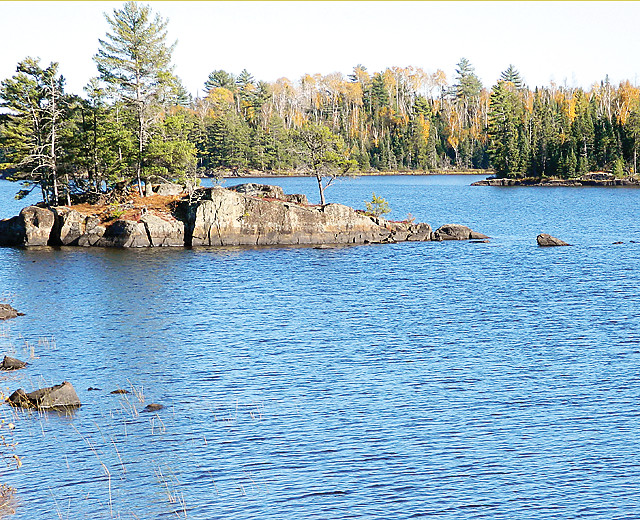Support the Timberjay by making a donation.
Bill would prohibit copper-nickel mining upstream of BWCAW
Legislation introduced by Rep. Betty McCollum likely faces long odds in current Congress
REGIONAL— Minnesota’s Fourth District Congresswoman Betty McCollum has introduced legislation in Washington that would prohibit sulfide-based copper-nickel mining in portions of …
This item is available in full to subscribers.
Attention subscribers
To continue reading, you will need to either log in to your subscriber account, or purchase a new subscription.
If you are a current print subscriber, you can set up a free website account and connect your subscription to it by clicking here.
If you are a digital subscriber with an active, online-only subscription then you already have an account here. Just reset your password if you've not yet logged in to your account on this new site.
Otherwise, click here to view your options for subscribing.
Please log in to continue |
Bill would prohibit copper-nickel mining upstream of BWCAW
Legislation introduced by Rep. Betty McCollum likely faces long odds in current Congress
REGIONAL— Minnesota’s Fourth District Congresswoman Betty McCollum has introduced legislation in Washington that would prohibit sulfide-based copper-nickel mining in portions of the Superior National Forest located upstream of the Boundary Waters Canoe Area.
“Visitors from all over the world, all Americans, and especially Minnesotans who are proud to have it in our backyard know the Boundary Waters Canoe Area Wilderness is a special place,” Rep. McCollum said in a statement issued Wednesday. “From the pristine, clear waters, to the stillness and quiet that is nearly unmatched anywhere else in the nation – this place is a refuge and source of adventure for many. The BWCAW is intact today because of more than a century of protections. We have an obligation to continue this legacy.”
The bill, identified as H.R. 5598, would permanently withdraw approximately 234,000 acres of federal land within the Rainy River watershed from the federal mineral leasing program for sulfide-based minerals. The measure would not impact mineral leasing or mining for taconite, iron ore, granite, or gravel, which would still be allowed under the bill.
The measure clearly faces long odds of passage in the current Congress and would almost certainly face a presidential veto under the Trump administration, which restored mineral leases for the proposed Twin Metals copper-nickel mine that would be located in the area affected by McCollum’s legislation. That decision is currently under legal challenge, with a decision expected soon. The Twin Metals project is primarily owned by the Chilean mining giant Antofagasta, whose lobbyists have proven influential with the Trump Interior Department, which oversees federal mineral rights.
“This administration has signed off on some of the most destructive polluter giveaways in our nation’s history, and it obviously has no intention of stopping,” said House Natural Resources Committee Chairman Raul Grijalva, of Arizona, a co-sponsor of McCollum’s measure. “If we don’t draw the line at the Boundary Waters, there is no line – we have to fight this, and we have to win. Building a mine near a sensitive wilderness area shows exactly whose side President Trump is on and how his government will operate unless Congress and the American people put a stop to it.”
McCollum’s legislation also drew support from a long list of conservation groups, including Backcountry Hunters and Anglers, the Ruffed Grouse Society, and the Theodore Roosevelt Conservation Partnership, the National Wildlife Federation, and the American Sportfishing Association.
“The Boundary Waters is a world-class backcountry destination that provides some of the best fishing and hunting the world has to offer and is in urgent need of the same protections Yellowstone received in 2019,” said Lukas Leaf, executive director of Sportsmen for the Boundary Waters, another group backing the bill. “This legislation is the next step to ensuring America's most-visited wilderness, along with the public land and water surrounding it, have guaranteed protection for our future generations. We urge all outdoor enthusiasts from across the nation to contact Congress and express their support for this forward-looking bill.”
McCollum’s measure also has the support of Minnesota’s Third District Congressman Dean Phillips and several other members of Congress. Eighth District Congressman Pete Stauber is not among them. Stauber blasted McCollum’s measure as an intentional effort to “kill jobs” in northern Minnesota. “It is unfortunate that some of my colleagues continue to treat northern Minnesota as a playground to spend their weekends, rather than an area where people actually live, work, and raise their families,” said Stauber in a statement. “Make no mistake, this legislation is an attack on our way of life as it intends to rob many of my constituents of their livelihoods. I will fight this attempt at killing mining jobs in my district every step of the way. I’m confident that, with the support of the Trump administration, our way of life will prevail.”
It remains unclear whether the copper-nickel mining jobs suggested by Stauber are the horizon whether or not McCollum’s legislation ever becomes law. Given current metal prices, neither the Twin Metals nor PolyMet projects appear to be economically viable. PolyMet, even after issuance of its permits in late 2018, has struggled to find financial backing for the estimated $1 billion in start-up costs for its proposed NorthMet project near Hoyt Lakes. PolyMet stock was trading at 30 cents per share as of Jan. 16, suggesting investor interest in the project remains muted.
Twin Metals, which has proposed an underground mining operation, would be substantially more expensive to operate than the NorthMet mine. A 2014 financial report by a prior owner of the Twin Metals project suggested a substantially lower rate of return than was expected for PolyMet, which has proposed a less-costly open pit operation. To date, Twin Metals has not released financial projections for its most recent mine plan, released last month.






